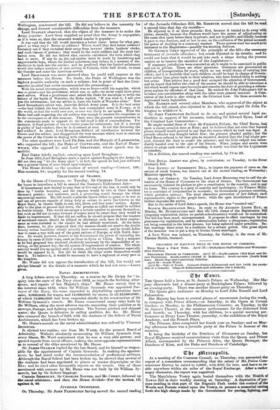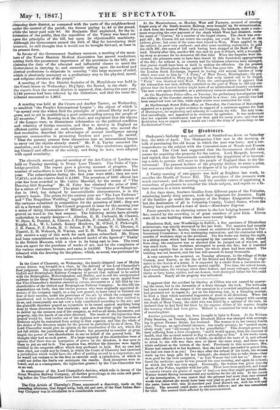Zbt jfiletrepolts.
At a meeting of the Common Council, on Thursday, was presented the report of a committee recommending that the salary of Mr. Police Com- missioner Harvey be raised to 1,0001., with 2001. for rent, and leave to re- side anywhere within six miles of the Royal Exchange. After a rather angry discussion, the report was negatived.
The Marylebone Vestry again busied themselves with the Health of Towns Bill at their weekly meeting on Saturday. A deputation of per- sona residing in that part of the Regent's Park under the control of the Woods and Forests waited upon the Vestry, to present a memorial setting forth the high charge macle by the Government for paving, lighting, and
cleansing their district, as compared with the parts of the neighbourhood under the control of the parish; the former paying Is. 4d. in the pound, while the latter paid only 9d. Sir Benjamin Hall explained, for the in- formation of the public, that the opposition of the Vestry was based not upon the principles of the bill, but upon its objectionable machinery. Although the Government named the 10th of May for introducing their measure, he still thought that it would not be brought forward, at least in its present form.
In favour of the Government Sanitary measure, a meeting of the mem- bers of the Tower Hamlets Medical Association has passed resolutions, setting forth the paramount importance of the provisions in the bill; pro- claiming the duty of the educated and influential classes to assist the Government in carrying it; and earnestly calling upon the medical and clerical professions to cooperate in securing "this large measure of relief, which is absolutely necessary as a preliminary step to the physical, moral, and religious elevation of the people."
A meeting of the five District Societies of St. Marylebone was held in the Court-house on Wednesday; Dr.! Spry, the Rector, in the chair. By the reports from the several districts it appeared, that, during the past year, 3,742 persons had been relieved by the visitations, and that the sums dis- tributed amounted to 1,3611.
A meeting was held at the Crown and Anchor Tavern, on Wednesday, to establish "the People's International League "; the object of which is "to spread over the widest field the principles of national liberty and pro- gress, and to aid in establishing a good understanding among the people of all countries." Dr. Bowring took the chair; and explained that the objects of the League were, to disseminate information on the political condition and relations of foreign countries, and thus to develop in England an efficient public opinion on such subjects. Mr. Ashurst, who moved the first resolution, described the advantages of mutual intelligence among separate communities in promoting freedom and peace. 1,1e tdofed, " That the persons present form themselves into an international league to carry out the objects already stated." Mr. P. A. Tayler seconded the resolution; and it was unanimously agreed to. Other resolutions, appoint- ing Council and officers of the society, and fixing its laws, were adopted with equal unanimity.
The eleventh annual general meeting of the Art-Union of London was herd on Tuesday morning, in Drury Lane Theatre. The Duke of Cam- bridge presided. The report gave a glowing account of progress. The number of subscribers is now 17,000, being an increase of 1,000 since last year. The subscriptions during the first year were 4891.; they are now 17,8711.; and the reserve fund is 2,1961. The premium of 500/. offered last year has been awarded to Mr. Calder Marshall, for the statue of "The Dancing Girl Reposing." Mr. H. Foley has obtained the prize of 1001. for a statue of" Innocence." The plate of the "Convalescent of Weterloo," due in 1845, but delayed by uncontrollable circumstances, is in the printer's hands. The prints for the current year are "The Last Embrace" and " The Neapolitan Wedding," together with the outlines from seven of the cartoons submitted in competition for the premium of 5001.: they are all in a forward state. The Council proposed to issue for the ensuing year a series of thirty illustrations of Milton's L'Allegro and Ii Penserose, en- graved on wood in the best manner. The following artists have already undertaken to supply designs—J. Absolon, E. kl. Corbould, M. Claxton, Dyes, E. Duncan, A. Elmore, J. Franklin, F. Goodall, J. Gilbert, J. P. Knight, R,A., W. L. Leitch, Kenny Meadows, H." O'Neil, F. Pickersgill, J. N. Paton, P. F. Poole, H. C. Selous, F. W. Topham, W. C. Thomas, J. Term-lel, E. H. Wehnert, H. Warren, and E. M. Ward- Every subscriber will receive a oopy of this work for each guinea subscribed. Mr. Nixon had been oommissioned to make a reduced model of the figure of" Thalia" in the British Museum, with a view to its being cast in iron. The total sum set apart for the purchase of works of art, and for the completion of the various statuettes, bronzes, and casts, is 14,933/. The proceedings ter- minated with the drawing for the prizes; which, as usual, was performed by two ladies.
In the Court of Chancery, on Wednesday, the keenly-litigated case of Mosley versus Alston was brought to a close, by the delivery of the Lord Chancellor's final judgment. The question involved the right of the present directors of the Oxford and Birmingham Railway Company to permit that railroad to be united with the Birmingham, Wolverhampton, and Dudley, and to sell the amalgamated railways to the Great Western Company. The matter came up on appeal from the Vice-Chancellor's decision overruling certain demurrers to a bill filed by two shareholders of the Oxford and Birmingham Railway Company. In this bill the shareholders set forth, that the twelve persons who were originally appointed di- rectors of the company ought, on a day now passed, to have voted or balloted out four of their number, under the provisions of the act by which the company was constituted; and to have elected four others in their place; that they omitted to do so, and consequently are not now a body constituted according to the act; and the plaintiffs therefore prayed an injunction to be issued against anything being done by those directors in that character; and also that they might be ordered to deliver up the common seal of the company, as well as all deeds, documents, and property, into the hands of six other directors. The result of the injunction thus prayed would be, that twelve out of the eighteen now exercising the functions of dim. tors might be restrained from acting in that capacity, and that the whole of the duties of the directors might for the present be performed by six of them. The Lord Chancellor would give no opinion on the construction of the act, which did not fall within the jurisdiction of the Court; but proceeded to consider at great length the power of two shareholders to sue on behalf of the general body. He thought they had no such power. If a large majority of the shareholders were of opinion that there was an usurpation of power by the directors, it was open to them to put an end to it. The question was, whether the directors were legally entitled to the corporate offices which they professed to hold. But no case had been cited, nor could any be found, in which the Court of Chancery had exercised a jurisdiction which would have the effect of putting an end to a corporation; and he would not venture to be the first to exercise such a jurisdiction, of which he could not define the limits nor anticipate the results. Both demurrers were al- lowed; and as a consequence, the injunction granted by the Vice-Chancellor was at an end.
In consequence of the Lord Chancellor's decision, which tells in favour of the Great Western Railway Company, all further proceedings in the suits still pend- ing before the Vice-Chancellor have been abandoned.
The City Article of Thursday's Times announced a discovery, made on the preceding afternoon, that forged scrip, both old and new, of the East Indian Rail- way Company was in circulation to a considerable amount. At the Mansionhouse, on Monday, West and Farmery, accused of uttering forged scrip of the South-western Railway, were brought up for reexamination. A clerk from the house of Messrs. Price and Company, the bankers, made a state- ment respecting the over-payment of the check which West had obtained, under the name of "(,raven," for a number of the forged shares. The check was over- paid 401; Mr. Craven did not return the surplus nor could he be found at the address given; but some of the notes were traced to West. When applied to on the subject, he grew very confused; and after some rambling statements, he paid the clerk 204 two notes of 10/ each having been stopped at the Rank of Eng- land. Shortly after this, attother 401. was eent by post to Price's, with a trumped- up story to account for its detension till that time. When the forgeries were dis- covered, the prisoners seem to have been traced by this fraudulent appropriation of the 401.; for without it, so cleverly had the business otherwise been managed, that justice would have been at fault in seeking the offenders. On the present occasion, the Birmingham charge against West was gone into. Mr. Berkeley, of the London Stock Exchange, deposed to having sold several batches of scrip which were sent to him by J. Perry," of Moor Street, Birmingham; the pro- ceeds he transmitted to Perry day by day; that scrip turned out to be forged. " Perry " was identical with West. From the correspondence it appears that the transaction was very skilfully contrived on the part of Perry to lull any MS- picions that the London broker might have of an unintroduced country customer. The men were again remanded, as a preliminary towards commitment for trial.
At the Marylebone Police-office, on Tuesday, the preliminary inrestigatien 11114 the robbery at the Camden station was brought to a close: two persons who had been suspected were set free, white eight others were committed for trial.
At Marlborough Street Police-office, on Thursday, the Countess of Morningtott appeared as a pauper, to give evidence in support of a summons against the Earl of Monfington, for neglecting and refusing to maintain his wife. The lady trem- bled exceedingly, and appeared to be overcome by agitation. It was understood that her separate maintenance had not been paid for many years; and that her destitution was so urgent that it would not I rook the delay of proceedings in the Ecclesiastical Court.



























 Previous page
Previous page